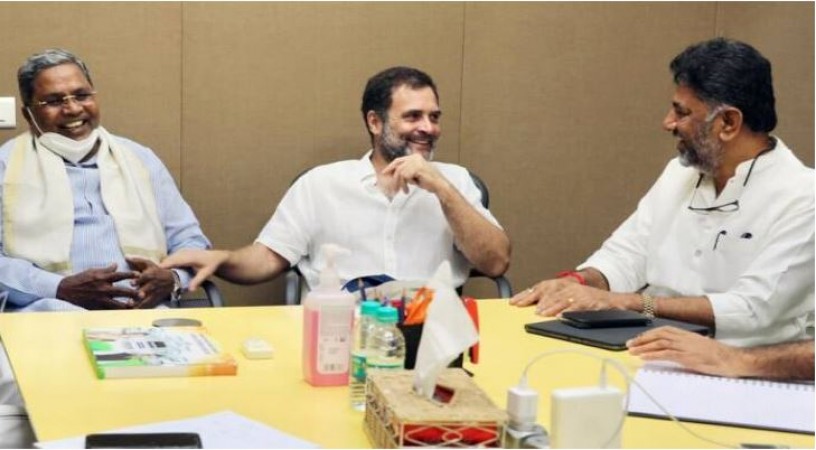
Bangalore: The transition of political power can often lead to significant shifts in policy and resource allocation. In the case of Karnataka, India, a state once hailed for its industrial growth and power surplus status, the change in government from BJP to Congress brought about a series of transformations, not all of which have been well-received.
In recent times, the state of Karnataka in India has faced numerous challenges, with a particular focus on the impact of political decisions related to free electricity and other policy changes. This article delves into the consequences of these decisions on the state's industries and its economy.
1. High Hopes for Bellary's Jeans Industry Dashed
Before the Karnataka elections, Rahul Gandhi promised a special package of Rs 5,000 crore for Bellary, with grand plans to transform it into the 'jeans capital of India.' However, subsequent events have shown a different story, with power cuts causing havoc in the local jeans industry, leaving it on the brink of collapse.
From 'We'll make Ballari the jeans capital' during elections to 'Power cuts hit Ballari's jeans industry hard' after elections. The mercy of the government in full display! #ElectoralPromises pic.twitter.com/5w0u6zTj4P
— Priyal Bhardwaj (@Ipriyalbhardwaj) October 25, 2023
2. Power Cuts and Their Consequences
Electricity is the lifeblood of any industry, and the jeans industry in Bellary has been facing daily power cuts of 6 to 8 hours. This situation, coupled with load shedding, has brought the local jeans production to a standstill.
3. Rising Unemployment and Labor Shortage
Power cuts have resulted in a significant reduction in jeans production, causing a labor shortage in the industry. Workers, who are often paid per jeans produced, are now seeking alternative employment opportunities, leading to a reduction in earnings and an overall labor shortage.
4. Industries Migrating to Neighboring States
In order to sustain free electricity schemes in Karnataka cities, electricity supply is being reduced in urban and rural areas. This policy has prompted hundreds of small-scale industries in the border areas to move to neighboring states like Goa and Maharashtra, leading to an economic shift that could have far-reaching consequences.
5. Financial Consequences for Karnataka
Karnataka, once a power surplus state, is now purchasing electricity from other states and distributing it for free, resulting in significant financial losses. The consequences of such policies on the state's economy and its people are profound.
6. Congress's Unfulfilled Promises
Rahul Gandhi's ambitious promise to develop Bellary and boost the jeans industry with a Rs 5,000 crore package has not materialized, leaving the local population disappointed.
Even in past, Congress didn't provide development
— Mahesh Vikram Hegde ???????? (@mvmeet) July 27, 2023
In future too, Congress will maintain its consistency
Mr DK Shivkumar, you finally spoke the truth pic.twitter.com/bvmhHkfoWd
7. Karnataka Government's Admission
The Karnataka Deputy Chief Minister, DK Shivakumar, has publicly stated that this year the government will not be able to fund development schemes, as Rs 40,000 crore is earmarked to fulfill five pre-poll guarantees made by the Congress party. This decision raises concerns about the state's overall development.
8. New Dimension of Public Spending
The Karnataka government has announced a plan to spend Rs 1 crore on a copper statue of former Prime Minister Rajiv Gandhi. This extravagant expenditure has raised questions about the responsible use of public funds.
9. Dipping into SC-ST Funds
कर्नाटक में अपनी पाँच “मुफ़्त” गारंटी पूरी करने के नाम पर एक तरफ़ जहां कॉंग्रेस सरकार विकास कार्य पूरी तरह रोकने पर बाध्य है वहीं बंगलौर में राजीव गांधी की कांस्य प्रतिमा के लिये एक करोड़ रुपया खर्च कर रही है ।
— ANUPAM MISHRA (@scribe9104) August 2, 2023
ये वही पार्टी है जो सरदार पटेल की मूर्ति को पैसे की बर्बादी बता रही… pic.twitter.com/aQuL0VNfx7
In addition to halting development projects, the Congress government is now planning to allocate Rs 11,000 crore from Scheduled Castes/Tribes (SC-ST) funds to fulfill its election promises, affecting other critical welfare initiatives.
10. Rising Costs for Everyday Living
The Congress-led Karnataka government has also increased the price of Nandin milk by Rs 3 per liter, impacting the common man's cost of living. Bus fares have also been hiked, affecting those who rely on public transportation. Additionally, despite promises of free electricity, electricity rates have increased, leading to additional costs for those exceeding 200 units of consumption.
India Reacts Strongly to Hamas Leader's Remarks Against Sanatan Dharma
Gaza Crisis: Leaders Modi and al-Sisi Express Concerns Over Terrorism and Civilian Losses